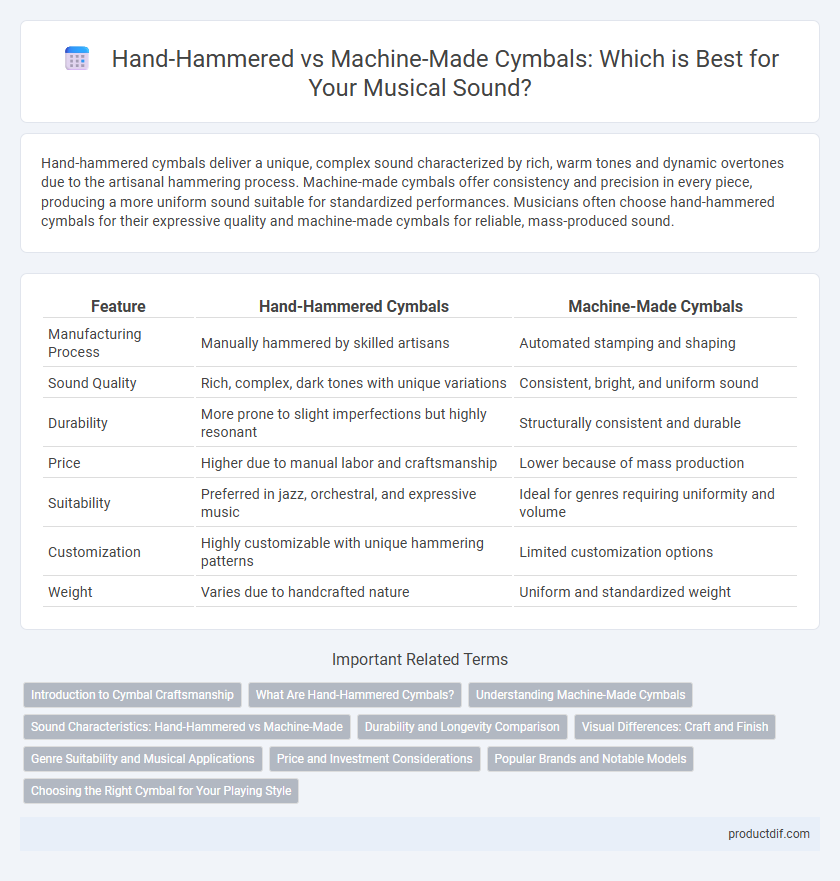Hand-hammered cymbals deliver a unique, complex sound characterized by rich, warm tones and dynamic overtones due to the artisanal hammering process. Machine-made cymbals offer consistency and precision in every piece, producing a more uniform sound suitable for standardized performances. Musicians often choose hand-hammered cymbals for their expressive quality and machine-made cymbals for reliable, mass-produced sound.
Table of Comparison
| Feature | Hand-Hammered Cymbals | Machine-Made Cymbals |
|---|---|---|
| Manufacturing Process | Manually hammered by skilled artisans | Automated stamping and shaping |
| Sound Quality | Rich, complex, dark tones with unique variations | Consistent, bright, and uniform sound |
| Durability | More prone to slight imperfections but highly resonant | Structurally consistent and durable |
| Price | Higher due to manual labor and craftsmanship | Lower because of mass production |
| Suitability | Preferred in jazz, orchestral, and expressive music | Ideal for genres requiring uniformity and volume |
| Customization | Highly customizable with unique hammering patterns | Limited customization options |
| Weight | Varies due to handcrafted nature | Uniform and standardized weight |
Introduction to Cymbal Craftsmanship
Hand-hammered cymbals are crafted through a meticulous process where skilled artisans shape and tune each cymbal individually, enhancing its tonal complexity and unique character. Machine-made cymbals, produced with automated precision, offer consistent sound quality and uniformity ideal for mass production. The craftsmanship technique directly impacts the cymbal's resonance, sustain, and dynamic response, making hand-hammered cymbals preferred for nuanced musical expression.
What Are Hand-Hammered Cymbals?
Hand-hammered cymbals are crafted through a meticulous process where artisans shape and refine the metal using traditional hammers, resulting in unique tonal characteristics and complex sound textures. This manual technique creates variations in thickness and density that enhance the cymbal's responsiveness and warmth, distinguishing it from uniformly produced machine-made cymbals. Musicians often prefer hand-hammered cymbals for their rich, dynamic sounds and increased musical expression.
Understanding Machine-Made Cymbals
Machine-made cymbals are produced using precision casting and stamping techniques that ensure uniform thickness and consistent sound quality. These cymbals often feature a brighter, more controlled tone compared to hand-hammered variants due to their standardized manufacturing process. Advanced machinery enables mass production with tight tolerances, making machine-made cymbals more affordable and accessible for beginner and intermediate drummers.
Sound Characteristics: Hand-Hammered vs Machine-Made
Hand-hammered cymbals produce a complex, rich sound with varied tonal nuances due to the irregular hammering patterns, offering warmth and depth preferred by jazz and orchestral drummers. Machine-made cymbals deliver a brighter, more consistent tone with uniform hammer marks, ideal for rock and pop genres seeking clarity and projection. The handcrafted nature of hand-hammered cymbals results in more dynamic overtones and a darker timbre, contrasting with the mechanical precision and controlled sustain of machine-made cymbals.
Durability and Longevity Comparison
Hand-hammered cymbals exhibit superior durability due to the meticulous craftsmanship that evenly distributes metal stress, enhancing their longevity under intense playing conditions. Machine-made cymbals often feature consistent thickness and uniform alloy composition, providing reliable durability but may wear out faster with extended heavy use compared to hand-hammered options. Investing in hand-hammered cymbals typically results in longer-lasting performance and sustained tonal quality, making them preferable for professional drummers seeking durability and endurance.
Visual Differences: Craft and Finish
Hand-hammered cymbals exhibit irregular hammer marks and uneven surface textures, showcasing the artisan's touch and unique imperfections. Machine-made cymbals feature uniform patterns and smooth, consistent finishes, reflecting precision and mass production techniques. The visual contrast between the two methods highlights the handcrafted nature versus mechanized uniformity in cymbal crafting.
Genre Suitability and Musical Applications
Hand-hammered cymbals offer a complex, warm tone favored in jazz, classical, and acoustic genres due to their diverse overtones and dynamic response. Machine-made cymbals provide consistent, bright, and more durable sounds suited for rock, pop, and live amplified performances. Musicians select hand-hammered cymbals for expressive, nuanced playing, while machine-made versions are preferred for precision and volume in high-energy settings.
Price and Investment Considerations
Hand-hammered cymbals typically command higher prices due to their artisanal crafting process, making them a valuable investment for professional musicians seeking unique tonal qualities and durability. Machine-made cymbals offer a more budget-friendly option with consistent sound, appealing to beginners and those with limited budgets. Evaluating long-term value involves balancing the initial cost against potential performance benefits and resale value, where hand-hammered cymbals often retain greater appreciation.
Popular Brands and Notable Models
Hand-hammered cymbals are often favored by professional drummers for their rich, complex tones, with popular brands including Zildjian's K Constantinople series and Sabian's HHX Evolution line. Machine-made cymbals, such as those from Meinl's Classics Custom and Paiste's PST 7 series, offer consistent sound quality and durability suited for beginners and intermediate players. Notable models balance craftsmanship and playability, making the choice dependent on the desired tonal characteristics and budget.
Choosing the Right Cymbal for Your Playing Style
Hand-hammered cymbals offer complex tonal variations and dynamic response ideal for jazz and expressive playing styles, while machine-made cymbals provide consistent sound quality favored in rock and pop genres. Evaluating the weight, alloy composition, and hammering technique helps drummers select cymbals that complement their preferred sound and genre. Musicians should consider their playing environment and musical needs to determine whether the nuanced hand craftsmanship or uniform machine precision best suits their style.
Hand-hammered cymbals vs Machine-made cymbals Infographic

 productdif.com
productdif.com